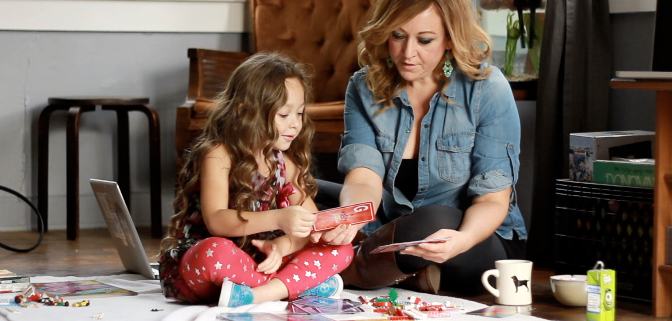Student trailblazes in toy-making industry

(Photo courtesy of Jennifer Ellis)
Self-proclaimed tinkerer and Iovine and Young student Jennifer Ellis first started her toy making journey while working at the Innovation Lab at the Annenberg School for Communication and Journalism. After noticing the different ways students around her used technology to create interesting gadgets, she wanted her four-year-old daughter to learn more about science, math and technology while she played.
However, having a difficult time finding age appropriate products that focused on educating young children, Ellis decided to create her first toy project, Giggle Chips.
The computer science flash card game uses STEM-related terms to help children recognize key concepts at an early age to turn their attention to the field. The card set also has multiple levels of play including alphabets, color matching, numbers and binary number matching and shapes to introduce children to STEM subjects at an age appropriate level and to ensure better understanding of science and math concepts in their future.
The popularity of Giggle Chips led Ellis and her daughter to be invited on the ABC show “Toy Box” and put her in touch with the National Science Foundation. Ellis was also selected as one of 20 women in the United States for the Google Women Techmakers in Computer Science Scholars Program in 2020, where she won a $10,000 scholarship.
Ellis started working on her next toy project, Chiquitos, which means “little ones,” after noticing the lack of products representing her Latinx culture.
“[I realized] by trying and sharing your message about issues … you have in the world, that people will listen,” Ellis said. “So Giggle Chips got me to a certain level of success, but then I also realized that I have to pivot. And that’s why I’m working with Chiquitos to serve the Hispanic community through storytelling with games and toys.”
Chiquitos will include various games related to STEM subjects and Latinx culture. Their first game, Makey Shakey Molcajete, is a coding game that teaches children five years and older about building an algorithm through a salsa recipe. Ellis feels the board game format will help children learn alongside their family and friends in a team environment.
“The thing that I care most about is just making sure that little kids have access to STEM education and I feel like when you make it fun and simple for kids, and especially for their families,” Ellis said, “it’s a good entry way to learn about STEM.”
Alongside her personal projects, Ellis also started Toy and Game Inventors at USC, a campus organization that helps students who are building physical toy models find resources, including inventor mentors and contacts within the toy industry. The organization, started by Ellis and her two IYA peers Alyssa Goldberg and Bansini Doshi, looks to help students grow and flourish as toy inventors.
“Our goal is to become a forum for students that are either interested in [toy design] as a hobby, but also for people that want professional development in that particular industry,” Doshi, the organization’s vice president, said. “We’re hoping to be a little bit of a family for people that are interested in toys and games.”
Ellis also recognized that one of the ways that they can embrace the gap between culture and toys is by holding events where children create their own toys that communicate their cultures and backgrounds. The organization is planning an upcoming virtual event which invites young children to use recycled materials and available resources to make their own toys related to a specific theme at home. One of the themes they plan on employing is culture and heritage.
“I realized with my toy inventor friends at USC that there’s a gap with talking about culture,” Ellis said. “So I think the biggest way that we could embrace it is also just having events where kids could also use games and toys as a medium, like a communication tool to share their stories about their culture.”
Goldberg and Doshi are also currently working on numerous projects related to toys about culture and STEM. They credit their passion and inspiration to Ellis, who they say has been a trailblazer in the industry and a mentor to them.
“When I started talking to her, I learned so much about her and I learned all of this history that she has done in the game industry,” Goldberg said. “I was just totally fascinated by the things that she was working on. She’s always coming up with new ideas … I was just so impressed and in awe of her talent and her drive that I just couldn’t help but want to be a part of all of her things that she was working on.”

